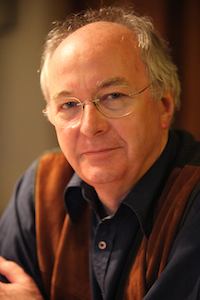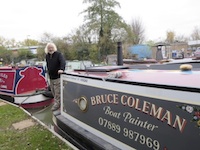Philip Pullman
 The world famous author Philip Pullman lives in Oxford and is a great admirer of the canal which he describes in his interview as “ coming into town quietly almost surreptitiously without many people being aware of it; not a great thundering highway but a secretive back street sort of thing and I like that and enjoy it. I also enjoy the history of it.”
The world famous author Philip Pullman lives in Oxford and is a great admirer of the canal which he describes in his interview as “ coming into town quietly almost surreptitiously without many people being aware of it; not a great thundering highway but a secretive back street sort of thing and I like that and enjoy it. I also enjoy the history of it.”
Philip talks about the Northern Lights, the first of his Dark Materials trilogy, which begins in Oxford and describes the escapades of Lyra with the ‘Gyptians. These water travellers bear more than a passing resemblance to working boaters as they too use the canals for travel and trade but Philip feels that they were not directly borrowed from local history but resulted from weaving together mythology and traditions.
Although he was at university in Oxford, Philip admits to not being terribly aware of the canal given his studies and other pursuits. However after living, working and writing in the city he talks about his involvement in the community protests that followed the sale of the Jericho boatyard site to developers and his chagrin at the activities of the City Council. Listen to more of this interview with Philip Pullman at the Oxfordshire History Centre.
Bruce Colman
 Bruce first encountered the Oxford Canal when his parents bought a pub, the Three Pigeons at Kirtlington in the 1960s. Working boaters would stop and have a drink and he got to know many well, so well in fact that on his school holidays he worked on one of the coal boats and travelled around the canals of south England. He learnt boating and roping but has never forgotten the advice offered by one old boater, “The way to handle your boat boy is to imagine that it’s made of glass.”
Bruce first encountered the Oxford Canal when his parents bought a pub, the Three Pigeons at Kirtlington in the 1960s. Working boaters would stop and have a drink and he got to know many well, so well in fact that on his school holidays he worked on one of the coal boats and travelled around the canals of south England. He learnt boating and roping but has never forgotten the advice offered by one old boater, “The way to handle your boat boy is to imagine that it’s made of glass.”
Bruce admits to becoming besotted with boats and eventually realised his dream of living on one and has continued to do so for most of his life. He became a skilled boat painter and found work by word of mouth moving from one craft to another over the course of many years. Bruce is also a painter of canal ware and demonstrated this traditional art form at the Oxford Heritage family canal art day at the Town Hall on February 20 2014. Over 80 years of age he now lives on a boat at Banbury, still takes canal ware commissions and plays in a band ‘Half Cut Folk’. To hear more about Bruce’s life and his boat painting visit the Oxfordshire History Centre
Michael Stockford
 Michael Stockford Michael was born in the plough at Wolvercote in 1931 and has written 2 books: Growing up in Wolvercote 1931-51 which sold out and was followed by 'THEM AND US Memories of Upper and Lower Wolvercote 1900 -1980'. The ‘them and us’ in the title refers to the Wolvercote community divided by the railway and the Canal. Michael could see both from his bedroom window as he was growing up and his interest, nay passion has never dimmed.
Michael Stockford Michael was born in the plough at Wolvercote in 1931 and has written 2 books: Growing up in Wolvercote 1931-51 which sold out and was followed by 'THEM AND US Memories of Upper and Lower Wolvercote 1900 -1980'. The ‘them and us’ in the title refers to the Wolvercote community divided by the railway and the Canal. Michael could see both from his bedroom window as he was growing up and his interest, nay passion has never dimmed.
In his interview, Michael shared his memories of the boaters who used to tie up on the Oxford canal at the bottom of the Green. He observed that they kept themselves to themselves and rarely came into the pub itself. Young boys, probably teenagers or younger, would be sent to buy a jug of ale for the men. A boy would come to have their jug filled after which a piece of paper or similar was stuck over the mouth of the jug so that the adult receiving it could be confident that the carrier had not taken a drink en route! Hear more of Michael’s meticulous memories at the Oxfordshire History Centre.




